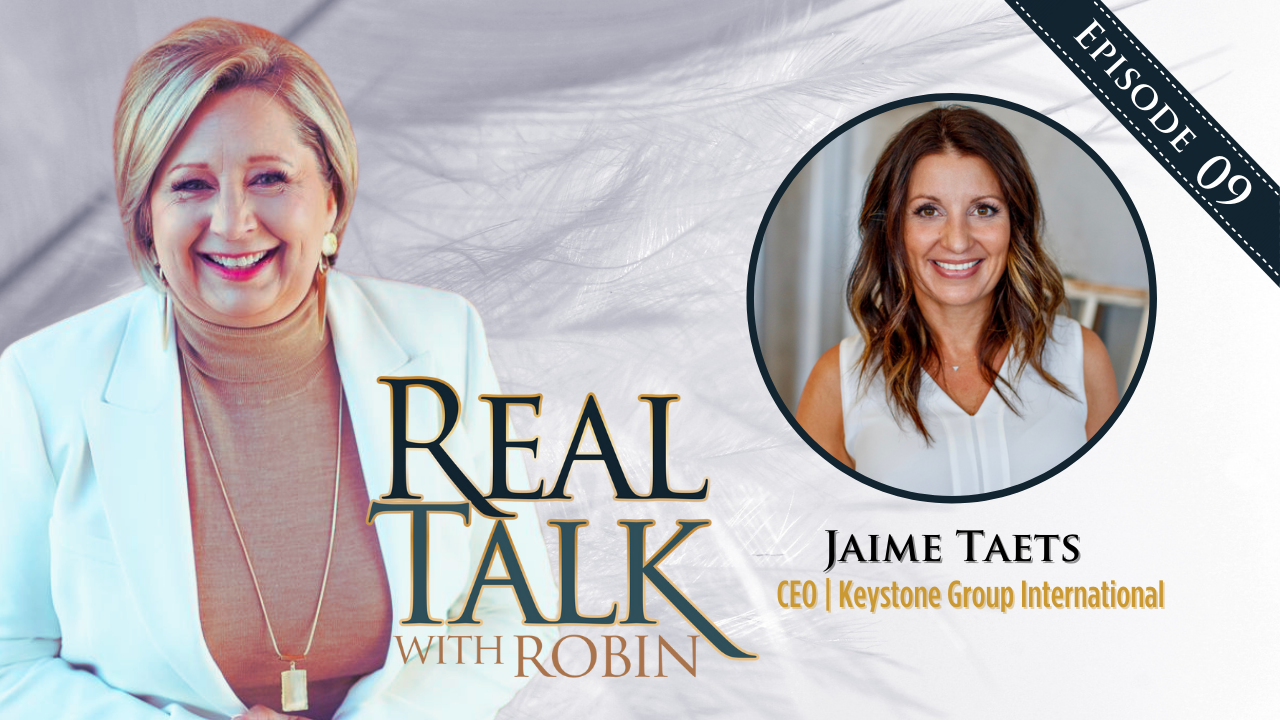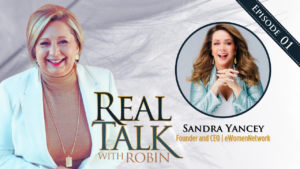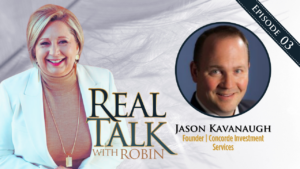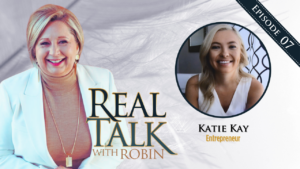What do big companies have that small business can adapt? This week, Robin sits with Keystone Group International CEO, Jaime Teats to discuss how business owners and leaders can create a competitive advantage in the industry. Jaime also shares how to leverage business strategies, people, and culture to create a thriving work environment- the secret ingredient to growth. If you enjoyed this episode, tune in again next week as Jaime reveals her secret to navigating the twists and turns through her book, You Are Here: Kick-Ass Inspiration for Navigating Your Journey to Succes.
“Just having a great business strategy is never enough. But you have to make sure the culture and the leaders within your organization are going to be able to support that business strategy that you’re trying to drive.” -Jaime Taets
Highlights:
01:10 Understanding How Big Businesses Run
05:06 How to Assess Company Culture
07:00 How to Grow and Move Up
09:36 Superpower Success
Resources:
Book
- Keystone Group International Culture Guide Book
- You Are Here: Kick-Ass Inspiration for Navigating Your Journey to Success by Jaime Taets
Accelerate your success! Join Robin and @KeystoneCORE CEO Jaime Taets as they share how you can leverage your business strategy, people, and culture to scale your business. #realtalk #podcast #business #businessstrategy #people #culture Share on X
Quotes:
02:09 “Just having a great business strategy is never enough. But you have to make sure the culture and the leaders within your organization are going to be able to support that business strategy that you’re trying to drive.” -Jaime Taets
03:37 “The biggest reason people were not engaging in culture is because they didn’t understand it. It was this nebulous thing that they knew they needed to care about, but they didn’t know what it meant.” -Jaime Taets
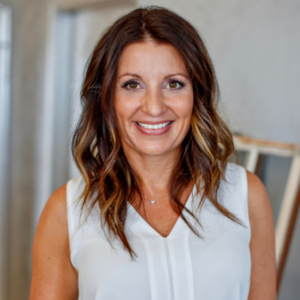
Meet Jaime:
As the CEO of Keystone Group International, Jaime created the organization to focus on leadership development, organizational strategy, and growth.
Before starting Keystone Group International, she spent 13 years in a large corporate environment in a variety of leadership roles, living and traveling globally. Jaime believes that strong leadership is the foundation for healthy and sustainable growth for any business. She uses her leadership experience to drive “real” discussions about how to drive high performance and healthy cultures within client organizations. Leaders need to be focused on helping their organizations create a positive mindset change to manage the constant change as their business grows and evolves.
Jaime’s areas of expertise are helping organizations identify the issue that is getting in their way of growth and creating a plan for improvement – specifically in areas of strategy, culture, and people. Jaime uses her SuperPower of Empathy and high EQ to build strong relationships with clients and leaders within organizations she works with. This same SuperPower allows her to build trust quickly which makes it easier to get to the root of the issue. The purpose behind Jaime’s work is to create an impact on the people she works with. Jaime is driven by the positive changes that she creates for her clients-it’s an addiction.
Transcriptions:
Robin Edgar Hello, and welcome to Real talk with Robin. I’m super excited to have Jaime Taets with us today, talking about her and her business and a book and superpower podcast and she’s got lots of stuff going on. So I know you’re really gonna enjoy this. Jaime Taets is the CEO of Keystone Group International. And their focus at Keystone Group International is really to help businesses accelerate their results. They do that through strategy, people, and culture. So Jaime, I just want to welcome you to my podcast and thank you for joining us, give us a little bit of background about you and how you got to where you are today and what you guys do there at Keystone Group International.
“Just having a great business strategy is never enough. But you have to make sure the culture and the leaders within your organization are going to be able to support that business strategy that you’re trying to drive.” -Jaime Taets
Jaime Taets Yeah. Thanks, Robin. Thanks for having me. So my background is in big corporate. So I started my career at one of the largest privately-held companies on the planet. I had a chance to travel a lot globally, and really understand how business leaders make decisions, how businesses are actually run, right? How risk tolerance and all of that kind of stuff. And so almost eight years ago, when I decided to start Keystone, I wanted to take everything I’ve learned in big business, and really bring it down to the small and mid-market to help them grow. Because growing upright and seeing a family business, I knew that there was a competitive advantage that these smaller businesses could have if they had some of the resources of these larger businesses, but they didn’t need all of it. And so that’s whereas you talk about strategy, people, and culture, we really work at the intersection of all three. It’s unique in the market, we’re a boutique firm, but we help organizations understand how to leverage all three of those for a true competitive advantage. Because just having a great business strategy, as you know, is never enough. But you’ve got to make sure the culture and the leaders within your organization are going to be able to support that business strategy that you’re trying to drive.
Robin Edgar Exactly. It just seems like so many people that are coaching or strategists or whatever they are that I’ve seen in my 31 years in business is they just kind of go down one path, and they’re helping the one path, but they can’t really, you know, open up the blinders a little bit to see, you know, all of the other areas that when you get this portion right, it doesn’t necessarily help the other portion. I know you’re a big believer and have really focused on culture, tell us a little bit about what you’re doing with culture, really how the pandemic probably brought that to life. I don’t think you slowed down at all last year. I think your business hit new record milestones, and part of that or a lot of that probably was in regards to your recognition of the fact of how important culture is in every single size business.
“The biggest reason people were not engaging in culture is because they didn’t understand it. It was this nebulous thing that they knew they needed to care about, but they didn’t know what it meant.” -Jaime Taets
Jaime Taets Right. And we did. I mean, you know, I feel grateful for 2020. And now what 2021 is looking like, and it is because we were already having these conversations with clients before the pandemic hit. And a lot of them were like, yep, we know we need to think about culture. And then when the pandemic hit, it was like, after a couple of months, they were like, okay, now we realize what you were talking about this whole time. And what we’ve done with culture is we have simplified it down to a set of factors that all business leaders can understand. Because the biggest reason people were not engaging in culture is because they didn’t understand it. It was this nebulous thing that they knew they needed to care about, but they didn’t really know what it meant. And because it’s intangible, a lot of it. So we’ve made it tangible. And that’s really our differentiator is that business leaders are like, I don’t have to be an organizational effectiveness, you know, master’s degree person to understand what you’re doing. And they can see the measurements, and they can see the improvements. Because like anything I equate it to, if you’re going to go on a diet, if you never lose a pound, your motivation wanes pretty quickly, right? It’s the same thing with culture is if we can show improvement, we can show metrics, you’re gonna stick to the plan. But if you don’t see those things, and you’re trying a bunch of different things, and reading a bunch of different books, and nothing’s working, what are the chances in three months that you’re still going to be focused on it? And so our goal is to keep it in front of you to show you the value and the improvement that’s happening so you stay committed to it, because that’s what’s ultimately going to change the work environment and create the competitive advantage.
Robin Edgar Yeah. And culture– you and I have talked about that before. It’s like people are like, well, how’s your culture? Well, it’s great. Well, how do you know what’s great? Is it great for you? Is it great for everyone? And I’m sure that you got a lot of that in the beginning when you started talking about that. You actually created a culture assessment then tell us just briefly about it. What that particularly measures or how that’s helping that business owner stay on the diet, so to speak.
Jaime Taets Yeah. And we’ve got this on our website, we give our model away. So anybody can go to Keystone Group I-N-T-L short for international.com. And you can get this model on our culture page. And the model is broken down to a set of 20 factors. And if you think the analogy I’ll give you is they’re all like threads of a fabric, right? If any of those factors is weak, or the thread is weak, then the entire fabric is weak. And so what we do is we go in and assess for a client through surveys, interviews, and focus groups, all 20 factors, and then we come back to them with a heat map, of sorts to say you’re red in these areas, you’re green in these areas, and then you’ve got some areas in the middle that you’re yellow. And what we explain to business leaders is that you can be really good in some areas of culture, and we’re going to tell you to keep doing those things. But if we don’t fix the red areas, you’re not getting the return on your investment for the things you are doing well, right? Perfect example is we have a lot of organizations when we come in that they’re fun. They do a lot of great team stuff, team barbecues, they go to the baseball games, right? They do the fun stuff. But when accountability, which is another one of our factors is low in the organization, your top players that A team is not going to stay just because you do fun stuff, right? They’re going to leave the organization. And so many organizations don’t tie those two things together to say you’ve got to be good at all of these things in some level for the things you’re really good at to shine.
Robin Edgar So tell me, why is it important do you think, because I know that it’s super important and I know you do too. But tell the people why do you think it’s important to have these outside business advisors, strategist, somebody that’s not in the business all of the time and the value that brings to it maybe business owners right now that are sitting here listening and going. Yeah, you know, I’ve got really smart people here. I’ve got people that do this and do that but we’re just not experiencing the growth or the results that we want. Why is that important?
Jaime Taets Well, it’s like all of us, right? We’re too close to it, we’ve got a job to do. And we’re really focused on it. But it’s hard to see the forest through the trees. And so our ideal client and not everyone’s our ideal client, it’s the ones that know that there’s probably a better way and they want that outside perspective. They want to grow as leaders, because when you’re at the top, and we work with the C suite of all of our clients when you’re at the top, where are you learning from? Maybe Harvard Business Review, right? You’re reading articles and things like that, but you need someone in has the broad, industry-agnostic experience to just come in and reframe things for you. So we tell all of our clients, and we usually don’t tell them right out of the gigs, because they wouldn’t believe us that most of the work we do is leadership development, right? We’re coming in, and we’re helping these leaders grow in their mindsets and their perspectives at the same time that we’re working on plans for the organization. And I think a lot of organizations, when you get to that level, kind of forget to invest in those people and in these experiences that are going to help them grow, which ultimately helps the company grow.
Robin Edgar Well and you and I can have a long discussion about the difference between being a manager and a leader because that’s also one of the areas that we have found in both of our fields work, even though they’re not the same that there are is a huge difference. And I think you have a lot of people that were managers that got put into leadership roles that just didn’t have those qualities that they needed to be true leaders.
Jaime Taets And in all fairness to them, we haven’t given them those things.
Robin Edgar Correct.
Jaime Taets We threw them into the deep end of the pool with no swimmies, you know, nothing to help them float. Like, we’ve got to invest in those people, because they are the ones that are making or breaking our business and it’s sustainable growth.
Robin Edgar Well, and we know the good people in the organization will leave if we don’t have these types of skills and just ability for them to see a path, for them to even in grow within the organization. You know, a lot of times they say you have to move out to move up. And I think a lot of the companies you’re working with are finding that. If we can provide that leadership, people can actually move up even within our organization. And we don’t have to bring other people in, we can give them what they need.
Jaime Taets Right.
Robin Edgar Well, we could talk for a long time. Luckily we have Jaime coming back in a couple weeks. She is going to do a more deep dive into her new book. Jaime show us the cover called You Are Here.
Jaime Taets I’m here.
Robin Edgar There it is the hard cover book and her podcast Superpower Success, which is super successful. And I know you’re gonna really enjoy that. So just give us a little snippet on that a little tease Jaime and then they can come back in a couple weeks for that podcast.
Jaime Taets Yeah. So podcast was started three years ago have very similar intent to the book was to share leaders journeys. Both myself and other guests leaders really successful business people that I’ve had come on to share the journeys to success because none of us have a straight line, none of it is smooth. And I want to share those stories so that we all learn and we can absorb that wisdom to help us get unstuck at whatever point we are, so that’s the purpose of the podcast. And it’s ultimately the purpose of the book is to help you get unstuck when you’re at those points of growth. So excited to talk about it.
Robin Edgar Thank you so much for being here, Jaime, how can people find out or get ahold of you if they’re interested in talking to you more?
Jaime Taets Yeah. LinkedIn is a great connection point. Jaime Adam Taets T-A-E-T-S, also our website Keystonegroupintl.com. Again, has all the models and a lot of information we give a lot of way. It’s one of our core values. We want to help people. And so we’re open to having a conversation if anybody wants to connect and see how we can help.
Robin Edgar Thank you so much for being here today, Jaime. And thank you to all of you for listening to Real Talk with Robin where grace and business sense come together to help you live an abundant life and Jaime has certainly helped us see how that’s possible today. So thanks for joining us and see you next time.
